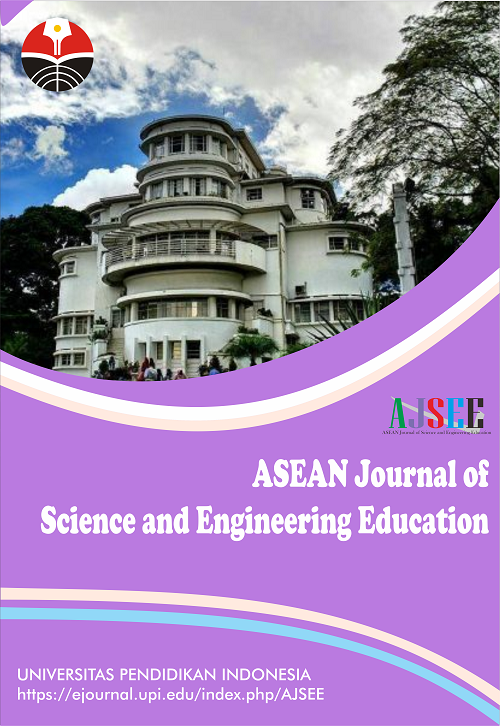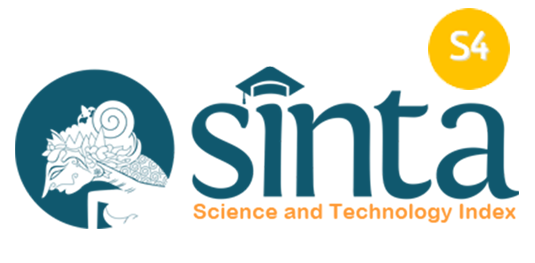Reducing Mathematics Anxiety through Smartphone-Assisted Jigsaw Cooperative Learning among Senior High School Students
Abstract
Mathematics anxiety continues to hinder students' performance and engagement, often resulting in poor learning outcomes. This study investigated the effect of a smartphone-assisted jigsaw cooperative learning strategy on the mathematics anxiety of senior high school students in Lagos State, Nigeria. Using a pretest-posttest quasi-experimental design with non-equivalent control groups, a total of 534 students were selected from two co-educational public schools. Instruments used included the Mathematics Anxiety Questionnaire (MAQ) and the Smartphone Efficacy Questionnaire (SEQ), with treatment delivered via the Roducate Educational App. Results revealed a reduction in mathematics anxiety among students exposed to the smartphone-assisted strategy compared to those taught using traditional methods. Although the decline was not statistically significant, trends showed the strategy favored male students and those with low smartphone efficacy. The findings suggest that technology-enhanced cooperative learning can support anxiety reduction and educational equity. Further research is recommended to explore long-term and broader impacts.
Keywords
Full Text:
PDFReferences
Adebiyi, I. A. A., Awofala, A. O. A. and Malik, N. A. (2024). Nomophobia and smartphone addiction as correlates of senior secondary school students’ mathematics anxiety. Acta Didactica Napocensia, 17(1), 118-129.
Al-Shannaq, M. M. M., and Leppavirta, J. (2020). Comparing the math anxiety of scientific facilities as related to achievement and some variables. International Journal of Instruction, 13(1), 341-352.
Amam, A., Darhim, D., Fatimah, S., and Noto, M. S. (2019, February). Math anxiety performance of the 8th grade students of junior high school. In Journal of Physics: Conference Series, 1157(4), 042099.
Aminuddin, H. B., Jiao, N., Jiang, Y., Hong, J., and Wang, W. (2021). Effectiveness of smartphone-based self-management interventions on self-efficacy, self-care activities, health-related quality of life and clinical outcomes in patients with type 2 diabetes: A systematic review and meta-analysis. International Journal of Nursing Studies, 116, 103286.
Asikhia, O. A. (2021). Gender effect on mathematics anxiety of secondary school students in Ogun West Senatorial District, Nigeria. Asian Journal of Education and Social Studies, 15(4), 17 - 23.
Atoyebi, O. M., and Atoyebi, S. B. (2022). The link between mathematics teaching strategies and students’ anxiety. Asian Journal of Education and Social Studies, 33(4), 48 – 57.
Awofala, A. O. A. (2019). Correlates of senior secondary school students’ mathematics achievement. Educatia 21 Journal, 17, 15-25.
Awofala, A. O. A. (2020). Are the keyboards weightier than the biros? The effect of computer-based testing on students’ achievement and anxiety in mathematics. Indonesian Journal of Informatics Education, 4(1), 1-8.
Awofala, A. O. A. and Nneji, L. M. (2012). Effect of framing and team assisted individualised instructional strategies on students’ achievement in mathematics. Journal of the Science Teachers Association of Nigeria, 43(3), 20-28.
Awofala, A. O. A. and Ogunsanya, O. I. (2025). Depression from and fear of COVID-19 as predictors of pre-service teachers’ mathematics anxiety. ASEAN Journal of Science and Engineering Education, 5(1), 1-12.
Awofala, A. O. A., Akinoso, S. O., Adeniyi, C. O., Jega, S. H., Fatade, A. O., and Arigbabu, A. A. (2024). Primary teachers’ mathematics anxiety and mathematics teaching anxiety as predictors of students’ performance in mathematics. ASEAN Journal of Science and Engineering Education, 4(1), 9-24.
Awofala, A. O. A., Akinoso, S. O., and Fatade, A. O. (2017). Attitudes towards computer and computer self-efficacy as predictors of preservice mathematics teachers’ computer anxiety. Acta Didactica Napocensia, 10(3), 91 - 108.
Awofala, A. O. A., and Akinoso, S. O. (2017). Assessment of psychometric properties of mathematics anxiety questionnaire by preservice teachers in South-West, Nigeria. ABACUS: The Journal of the Mathematical Association of Nigeria, 42(1), 355-369.
Awofala, A. O. A., and Awolola, S. A. (2011). The effect of self-efficacy, anxiety, attitude, and previous mathematics achievement on senior secondary students’ performance in mathematics. African Journal of Historical Sciences in Education, 7(2), 198 – 209.
Awofala, A. O. A., and Esealuka, A. R. (2021). Nomophobia, smartphone addiction, depression, and anxiety as predictors of internet addiction among Nigerian preservice mathematics teachers. Journal of Informatics and Vocational Education, 4(3), 107-117.
Awofala, A. O. A., and Lawal, R. F. (2019). Effect of lesson study on senior secondary school students’ achievement in mathematics. Journal of Science, Technology, Mathematics and Education, 15(3), 49-65.
Awofala, A. O. A., and Lawal, R. F. (2021). Effect of team assisted individualisation strategy on senior secondary school students’ motivation to learn mathematics. Nigerian Online Journal of Educational Sciences and Technology, 3(1), 36-46.
Awofala, A. O. A., and Odogwu, H. N. (2017). Assessing preservice teachers’ mathematics cognitive failures as related to mathematics anxiety and performance in undergraduate calculus. Acta Didactica Napocensia, 10(2), 81 – 97.
Awofala, A. O. A., Arigbabu, A. A. and Awofala, A. A. (2013). Effects of framing and team assisted individualised instructional strategies on senior secondary school pupils’ attitudes toward mathematics. Acta Didactica Napocensia, 6(1), 1 – 22.
Awofala, A. O. A., Olabiyi, O. S., Awofala, A. A., Arigbabu, A. A. Fatade, A. O., and Udeani, U. N. (2019). Attitudes toward computer, computer anxiety and gender as determinants of pre-service science, technology, and mathematics teachers’ computer self-efficacy. Digital Education Review, 36, 51-67.
Beilock, S. L., and Willingham, D. T. (2014). Math anxiety: Can teachers help students reduce it? Ask the Cognitive Scientist. American Educator, 38, 28–33.
Commodari, E., and La Rosa, V. L. (2021). General academic anxiety and mathematics anxiety in primary school. The impact of math anxiety on calculation skills. Acta Psychologica, 220, 103413.
Each, N., and Suppasetseree, S. (2021). The effects of mobile-blended cooperative learning on EFL students’ listening comprehension in Cambodian context. LEARN Journal: Language Education and Acquisition Research Network, 14(2), 143 – 170.
Fakomogbon, M. A., and Bolaji, H. A. (2017). Effects of collaborative learning styles on performance of students in a ubiquitous collaborative mobile learning environment. Contemporary Educational Technology, 8(3), 268 -279.
Gunderson, E. A., Park, D., Maloney, E. A., Beilok, S. L., and Levine, S. C. (2018). Reciprocal relations among motivational frameworks, math anxiety and mathematics achievement in early elementary schools. Journal of Cognitive Development, 19, 21 – 46.
Hills, F., Mammarella, I. C., Devine, A., Caviola, S., Passolunghi, M. C., and Szucs, D. (2016). Maths anxiety in primary and secondary school students: Gender differences, developmental changes and anxiety specificity. Learning and Individual Differences, 48, 45-53.
James, A. O., Tunde, B. F., Ademuyiwa, A. C., and Bolanle, A. O. (2013). Effects of gender, mathematics anxiety and achievement motivation on college students’ achievement in mathematics. International Journal of Education and Literacy Studies, 1(1), 15-22.
Johnson, F. O., and Lawal, R. F. (2022). Effect of smartphone-assisted jigsaw cooperative learning on senior secondary school students’ achievement in mathematics within Education District IV, Lagos state. International Journal of Educational Research, 5(4), 1 – 9.
Kamran, F., Kanwal, A., Afzal, A., and Rafiq, S. (2023). Impact of interactive teaching methods on students learning outcomes at university level. Journal of Positive School Psychology, 7(7), 89-105.
Mahat, J., Ayub, A. F. M., and Wong, S. L. (2012). An assessment of students’ mobile self-efficacy, readiness & personal innovativeness towards mobile learning in higher education in Malaysia. Proceedia-Social and Behavioural Sciences 64, 284 – 290.
Mammarella, I. C., Caviola, S., Rossi, S., Patron, E., and Palomba, D. (2023). Multidimensional components of (state) mathematics anxiety: Behavioral, cognitive, emotional, and psychophysiological consequences. Annals of the New York Academy of Sciences, 1523(1), 91-103.
Mehidizadeh, S., Nojabaee, S. S., and Asgari, M. H. (2013). The effect of cooperative learning on mathematics anxiety and help seeking behavior. Journal of Basic and Applied Science Research, 3(3), 1185-1190.
Moliner, L., and Alegre, F. (2020). Peer tutoring effects on students’ mathematics anxiety: A middle school experience. Frontiers in psychology, 11, 1610.
Mutegi, C. M., Gitonga, C. M., and Rugano, P. (2021). Mathematics anxiety, attitude and performance among secondary school students in Kenya. Educational Research and Reviews, 16(6), 226 - 235.
Mutodi, P., and Ngirande, H. (2014). Exploring mathematics anxiety: Mathematics students’ experiences. Mediterranean Journal of Social Sciences, 5(1), 283-294.
Nikolopoulou, K., and Gialamas, V. (2017). High school pupils’ attitudes and self-efficacy of using mobile devices. Themes in Science & Technology Education, 10, 53-67.
Ozer, O., and Kilic, F. (2018). The effect of mobile assisted language learning environment on EFL students’ academic achievement, cognitive load and acceptance of mobile learning tools. Eurasia Journal of Mathematics, Science and Technology Education, 14(7), 2915 – 2928.
Perez-Fuentes, M. D. C., Nunez, A., Molero, M. D. M., Gazquez, J. J., Rosario, P., and Nunez, J. C. (2020). The role of anxiety in the relationship between self-efficacy and mathematics achievement. Psicologia Educative, 26(2), 137-143.
Richlan, L. E., Naslund-Hadley, E., Alonzo, H., Lyons, E., and Vollman, E. (2020). Teachers and students’ mathematics anxiety and achievement in a low-income national context. Mind, Brain and Education, 14(7), 400 – 414.
Salahot, E. D. (2022). The effects of math anxiety on math performance among secondary school students in Tanzania: A case of Arush city Council. International Journal of Scientific Research and Management, 10(12), 425-436.
Salman, M. F; Mohammed, A. S; Ogunlade, A. A., and Ayinla, J. O. (2012). Causes of mass failure in senior school certificate mathematics examination as viewed by secondary school teachers & students in Ondo, Nigeria. Journal of Education and Practice, 3(8), 79-89.
Shaikh, S. N. (2013). Mathematics anxiety factors and their influence on performance in mathematics in selected international schools in Bangkok. Journal of Education and Vocational Research, 4(3), 77 – 85.
Sopekan, O. S., and Awofala, A. O. A. (2019). Mathematics anxiety and mathematics beliefs as correlates of early childhood pre-service teachers’ numeracy skills. Pedacta, 9(2), 13-24.
Sung, Y. T., Chang, K. E., and Yang, J. M. (2015). How effective are mobile devices for language learning? A meta-analysis. Educational Research Review, 16, 68 – 84.
Toropova, A., Johansson, S., and Myrberg, E. (2019). The role of teacher characteristics for student achievement in mathematics and students’ perceptions of instructional quality. Education Inquiry, 10(4), 275 – 299.
Udonsa, A. E. (2015). Salient issues in students’ poor performance in mathematics at public examinations in Nigeria: A case study of selected secondary schools in Adamawa state. Journal of Research in Education and Society, 6(1), 23 – 35.
Van Mier, H. I., Schleepen, T. M. J., and Van Den Berg, F. C. G. (2018). Gender differences regarding the impact of math anxiety on arithmetic performance in second & fourth graders. Frontiers in Psychology, 9, 1 – 13.
Wang, Z., Rimfeld, K., Shakeshaft, N., Schofield, K., and Malanchini, M. (2020). The longitudinal role of mathematics anxiety in mathematics development: Issues of gender differences and domain-specificity. Journal of Adolescence, 80, 220-232.
Yang, S. (2012). Exploring college students’ attitude and self-efficacy of mobile learning. TOJET: The Turkish Online Journal of Educational Technology, 11(4), 148-153.
Zavareh, S. E. R. T., Bagheri, N., and Sabet, M. (2022). Effectiveness of cooperative learning on mathematics anxiety, academic motivation and academic buoyancy in high school students. Iranian Evolutionary and Educational Psychology Journal, 4(3), 410 – 421.
DOI: https://doi.org/10.17509/ajsee.v5i2.82807
Refbacks
- There are currently no refbacks.
Copyright (c) 2025 Universitas Pendidikan Indonesia

This work is licensed under a Creative Commons Attribution-ShareAlike 4.0 International License.














